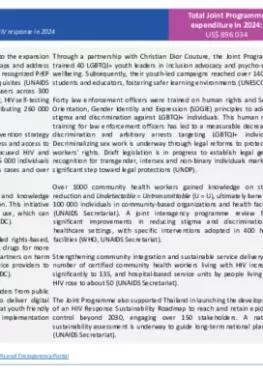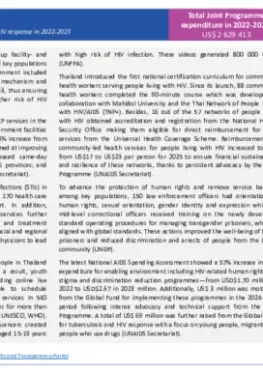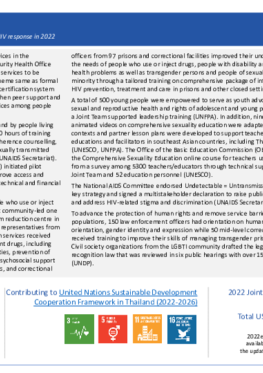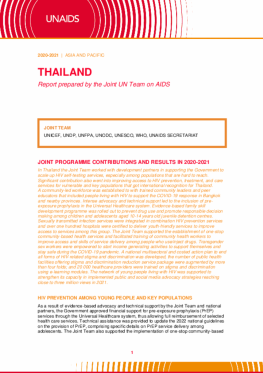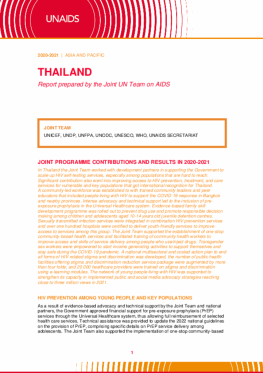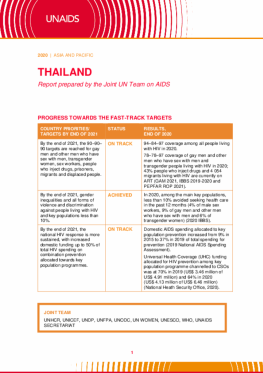|
Thailand
In 2024, continued advocacy by the Joint Programme led to the expansion of PrEP and HIV self-testing to bridge critical prevention gaps and address delays in HIV diagnosis. The Department of Disease Control recognized PrEP as a basic service available in any hospital without prerequisites (UNAIDS Secretariat). Access to PrEP expanded to about 29 000 users across 300 hospitals and key population health service sites. Moreover, HIV self-testing was scaled up through a public-private partnership, distributing 260 000 free testing kits (UNICEF, WHO, UNAIDS Secretariat).
The Joint Programme launched a comprehensive HIV prevention strategy for youth around World AIDS Day 2024, improving awareness and access to services, including in schools and universities. Youth-focused HIV and sexually transmitted infection screenings reached about 95 000 individuals and detected over 560 HIV cases, more than 1300 syphilis cases and over 100 co-infections (UNICEF, WHO, UNAIDS Secretariat).
The Joint Programme facilitated regional collaboration and knowledge sharing between Thailand and Viet Nam on harm reduction. This initiative strengthened responses to amphetamine-type stimulant use, which can hinder HIV prevention among certain key populations (UNODC).
With support from the Joint Programme, Thailand expanded rights-based, gender-responsive services for people who use and inject drugs for more effective HIV responses through trainings of 80 national partners on harm reduction for stimulant drug use, which empowered service providers to offer more integrated and community-based services (UNODC).
An e-learning programme aimed at equipping service providers from public and non-governmental sectors with the skills needed to deliver digital health services developed. Over 1000 healthcare providers at youth friendly health clinics were trained by the Joint Programme on the implementation of friendly health services for young people (UNICEF).
Through a partnership with Christian Dior Couture, the Joint Programme trained 40 LGBTQI+ youth leaders in inclusion advocacy and psycho-social wellbeing. Subsequently, their youth-led campaigns reached over 140 000 students and educators, fostering safer learning environments (UNESCO).
Forty law enforcement officers were trained on human rights and Sexual Orientation, Gender Identity and Expression (SOGIE) principles to address stigma and discrimination against LGBTQI+ individuals. This human rights training for law enforcement officers has led to a measurable decrease in discrimination and arbitrary arrests targeting LGBTQI+ individuals. Decriminalizing sex work is underway through legal reforms to protect sex workers’ rights. Draft legislation is in progress to establish legal gender recognition for transgender, intersex and non-binary individuals marking a significant step toward legal protections (UNDP).
Over 1000 community health workers gained knowledge on stigma reduction and Undetectable = Untransmittable (U = U), ultimately benefiting 100 000 individuals in community-based organizations and health facilities (UNAIDS Secretariat). A joint interagency programme review found significant improvements in reducing stigma and discrimination in healthcare settings, with specific interventions adopted in 400 health facilities (WHO, UNAIDS Secretariat).
Strengthening community integration and sustainable service delivery, the number of certified community health workers living with HIV increased significantly to 135, and hospital-based service units by people living with HIV rose to about 50 (UNAIDS Secretariat).
The Joint Programme also supported Thailand in launching the development of an HIV Response Sustainability Roadmap to reach and retain epidemic control beyond 2030, engaging over 150 stakeholders. A national sustainability assessment is underway to guide long-term national planning (UNAIDS Secretariat).


